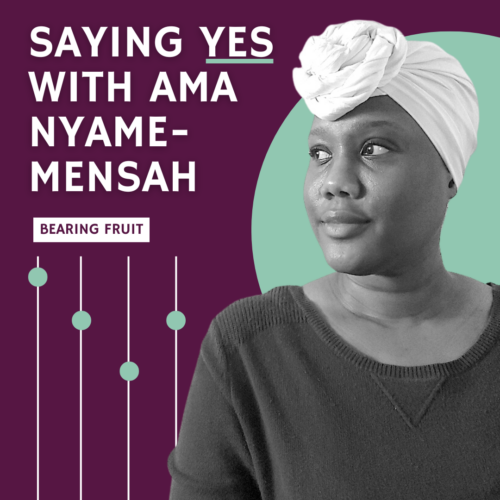Saying Yes with Ama Nyame-Mensah
Ama Nyame-Mensah DMd me with a super juicy comment: I think I have some prospective clients who are breaking the No Assholes rule.
Let me back up: Ama is a student in the first cohort of my Boost & Bloom course for entrepreneurs and she knew that my three rules (passed to me from my mentors, who had it passed to them) are: Fun, Lucrative, No Assholes.
Let me back up further: Ama runs a company named Analytics Made Accessible (handily acronymed AMA – get it?). It’s a few years old now. Ama and AMA help people explore, analyze, and communicate their data more effectively, primarily by teaching folks to create compelling charts and share data stories that matter.
A company after my own heart.
And most of the time, I see young entrepreneurs so stressed about paying the bills that they’re saying yes to everything that even remotely looks like it could contribute to cash flow, even if the prospective client is kind of a jerk.
But not Ama.
Stephanie: Ama, you’ve clearly done the internal work to know your boundaries and to be able to spot a jerk from a mile away. What exactly is on your red flag list?
Ama: I will never forget a piece of advice my sister Akua —an Executive and Leadership Coach—shared with me a couple years ago: “If you say yes to everyone, you’re always saying no to yourself.”
Stephanie: I’m reading that again.
Ama: And she’s right.
When I first launched my business, I said yes to everything and everyone. I didn’t care who I worked with as long as I got my name out there and made money—bad idea. I was saying yes to projects that weren’t a good fit and clients who didn’t respect me.
The result: I was miserable.
Hustle culture tells us that overworking and accepting mistreatment from demanding clients are necessary to achieve success. Working with difficult clients who disrespect you and your boundaries and undervalue your expertise will ruin your business and wreak havoc on your financial and mental health.
Stephanie: Give us an example of client disrespect. I’m hoping others will read this and start to recognize when it’s happening to them.
Ama: I’ll share two flavors of disrespect.
Flavor #1: Not valuing my time.
I once had a prospective client reach out to me, looking for an external evaluator for a project.
I will not lie; I initially disregarded the message and sent it to my junk mail because I thought it was spam. But curiosity got the best of me, and I responded to the email, thanking them for sharing the opportunity and setting up a time to chat about the project.
Readers, I kid you not; over two months, this individual rescheduled on me FOUR DIFFERENT TIMES (including once right as we were supposed to log into our scheduled Zoom meeting)!
And if you’re wondering, we never connected about the project.
Then, three months after not connecting with this person, I got an email “thanking” me for my interest in the consultant position (huh?) and completing and submitting documentation (I never submitted any paperwork) …BUT they had decided to proceed with another party. (I got a good laugh out of that one.)
Looking back, the biggest mistake I made was going back and forth, sending multiple Zoom links to a prospective client who was never interested in working with me.
Life happens, meetings get moved, deadlines get shifted, etc. And I cannot penalize someone simply because they’re late…once (maybe twice). But when someone repeatedly reschedules, postpones, or does not show up before becoming a client, you can guarantee they will do the same once you start working with them.
Bottom line: Don’t work with people who do not respect you or your time.
Flavor #2: Rude and unkind.
A couple of years ago, someone approached me to lead a potential project their team had been kicking around. They were attached to a cool group, so I was excited about collaborating with them. So much so that I let a lot of things slide that I shouldn’t have.
By the time I realized something was very off, I had already done several months of free work with no contract in place. But I thought: No worries; we had talked about them paying me for the work I had done to shape the project upfront after pushing the paperwork through.
Readers, that never happened.
When the paperwork was almost complete, everything fell apart. The organization spontaneously came up with a new deposit policy, which they promptly blamed on legal. And when I reached out to have a conversation with my point of contact, the conversation went horribly, horribly wrong.
What I hoped would be a moment for us to come to an understanding about my boundaries and a reiteration of what we had previously agreed to devolved into a weird conversation where they casually dropped that I should be grateful that they would even consider working with me on a project like this.
Rude much?
Remember, you are a business owner. You do a job, get paid, and the cycle continues. (That’s not to say you cannot forge long-lasting, mutually beneficial relationships with your clients.)
But some folks will make you think they are doing you a favor by working with you, even though it’s work they want (and usually need) done. Clients you partner/work with are not doing you a favor. There is no “favor” in business. People value what they pay for, and they pay for what they value.
Bottom line: Don’t work with unkind people.
And Stephanie’s bottom line: No spec work! No work before the contract!!
Now that I’ve been burned a few times, I know to look for these positive signs that someone (or an organization) will be a good partner:
- Collaborative: At the heart of any successful collaboration are communication and transparency. I am always excited by open-minded clients interested in working together to experiment and discover what works and what does not. Data + Design work is iterative, so partnering with folks open to hearing and giving feedback is key.
- Kindness: To some, respect can be bought. For example, if a client is purchasing your services, you (the consultant/entrepreneur) have to respect them while they can treat you (and their staff!) however they please. When I talk with prospective clients, I watch (and listen!) to how they interact with each other and me. People who treat others with respect and kindness are more likely to treat you with respect and kindness.
- Follow-through: Anyone can talk a good talk. But good prospective clients walk the walk. Verbal commitments are great, but they mean nothing without consistent action. This is where follow-through comes in. Follow-through is the key to creating trust in a new relationship. It lets people know you are serious and that you value their time. Follow-through at the beginning of a client relationship can be as simple as honoring meeting end times or demonstrating a commitment to a project by sharing a project description or proposed budget.
Knowing how you want to run your business, the types of clients you want to partner with, your values, and being comfortable communicating your expectations and boundaries will make you a happier entrepreneur.
What would you add to your Yes List? Tell Ama!


1 Comments